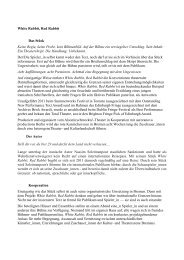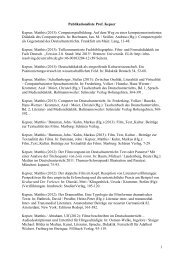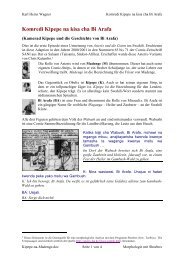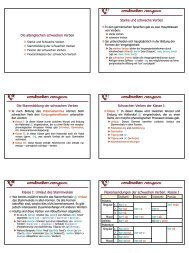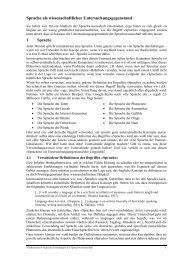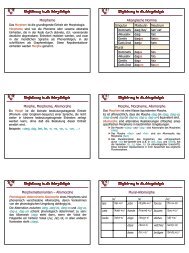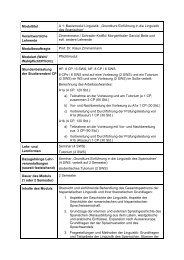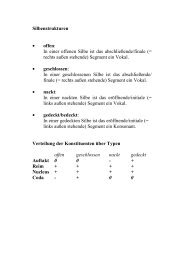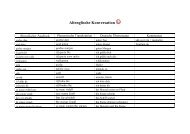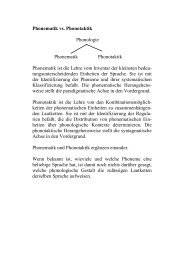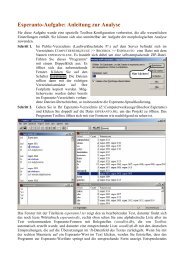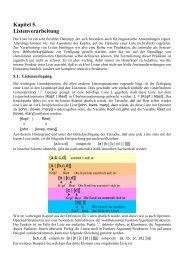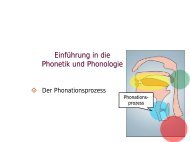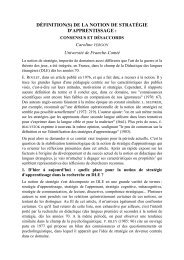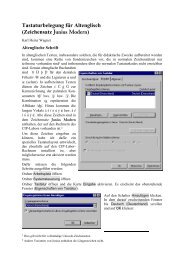Relativism and Universalism in Linguistics - Fachbereich 10 ...
Relativism and Universalism in Linguistics - Fachbereich 10 ...
Relativism and Universalism in Linguistics - Fachbereich 10 ...
You also want an ePaper? Increase the reach of your titles
YUMPU automatically turns print PDFs into web optimized ePapers that Google loves.
158 Workshops<br />
Ansche<strong>in</strong>end ‘apparently, seem<strong>in</strong>gly’ vs. sche<strong>in</strong>bar ‘seem<strong>in</strong>gly,<br />
at first sight’ <strong>in</strong> German:<br />
apparently only some people care<br />
Ammann, Andreas<br />
University of Bremen<br />
aammann@uni-bremen.de<br />
The German verb sche<strong>in</strong>en ‘seem’ has been placed <strong>in</strong>to the context of German modality by<br />
several l<strong>in</strong>guists (e.g. Diewald 2001). My focus will be on two modal expressions derived<br />
from it: ansche<strong>in</strong>end <strong>and</strong> sche<strong>in</strong>bar. Conservative descriptions of German grammar assign<br />
slightly dist<strong>in</strong>ct mean<strong>in</strong>gs to these modal adverbs. While both express that someth<strong>in</strong>g seems<br />
to be the case, sche<strong>in</strong>bar carries an additional counterfactual element: <strong>in</strong> reality it is not the<br />
case (Zifonun et al. 1997: 1133). I argue that it is most feasible to paraphrase the textbook<br />
def<strong>in</strong>ition of ansche<strong>in</strong>end as <strong>in</strong> (1a) <strong>and</strong> that of sche<strong>in</strong>bar as <strong>in</strong> (1b):<br />
(1a) it seems that p holds<br />
(1b) it only seems that p holds<br />
The counterfactual read<strong>in</strong>g of sche<strong>in</strong>bar is entailed <strong>in</strong> (1b), but not part of the encoded<br />
mean<strong>in</strong>g.<br />
It is well known that the dist<strong>in</strong>ction between (1a) <strong>and</strong> (1b) is not consistently observed <strong>in</strong> the<br />
spoken language, but the details are controversial. Some sources state that ansche<strong>in</strong>end <strong>and</strong><br />
sche<strong>in</strong>bar alternate freely (e.g.Scholze-Stubenrecht et al. 1997). A more precise claim is made e.g. by<br />
Bierwisch et al. (s.d.), an onl<strong>in</strong>e dictionary based on contemporary spoken <strong>and</strong> written data. It ascribes<br />
both the mean<strong>in</strong>gs <strong>in</strong> (1a) <strong>and</strong> (1b) to ansche<strong>in</strong>end, <strong>and</strong> to sche<strong>in</strong>bar as well, but <strong>in</strong> its case only for the<br />
spoken register. The entry suggests that sche<strong>in</strong>bar is still restricted to (1b) <strong>in</strong> written German.<br />
My paper tackles the follow<strong>in</strong>g questions:<br />
• What can we say about the distribution of the two adverbs <strong>in</strong> journalistic texts? How<br />
does this compare to the use <strong>in</strong> onl<strong>in</strong>e message boards – a genre that is written, but<br />
comes very close to colloquial speech <strong>in</strong> terms of <strong>in</strong>formality?<br />
• Assum<strong>in</strong>g that the adverbs, as well as sche<strong>in</strong>en, can be <strong>in</strong>terpreted as <strong>in</strong>ferential<br />
(=<strong>in</strong>direct evidential) or epistemic qualifications (=not stated as factual by the<br />
speaker): are there contexts <strong>in</strong> which evidential mean<strong>in</strong>g components are prom<strong>in</strong>ent,<br />
or epistemic ones?<br />
• What is the place of expressions of (1a) on an epistemic scale between weak<br />
possibility <strong>and</strong> strong probability?<br />
• appear to /seem to <strong>and</strong> apparently/seem<strong>in</strong>gly <strong>in</strong> English?<br />
References<br />
Bierwisch, Manfred et al. (s.d.): Das digitale Wörterbuch der deutschen Sprache des 20. Jh.<br />
http//:www.dwds.de (consulted <strong>in</strong> June 2006)<br />
Diewald, Gabriele (2001): “Sche<strong>in</strong>en-Probleme: Analogie, Konstruktionsmischung und die<br />
Sogwirkung aktiver Grammatikalisierungskanäle”. In: Reimar Müller & Marga Reis<br />
(eds.) (2001): Modalität und Modalverben im Deutschen. Hamburg: Helmut Buske, 87-<br />
1<strong>10</strong>.<br />
Scholze-Stubenrecht, Werner et al. ( 4 1997): Duden Richtiges und gutes Deutsch: Wörterbuch<br />
der sprachlichen Zweifelsfälle. Mannheim: Dudenverlag.<br />
Zifonun, Gisela et al. (1997): Grammatik der deutschen Sprache. B<strong>and</strong> II. Berl<strong>in</strong> /New York:<br />
de Gruyter.



